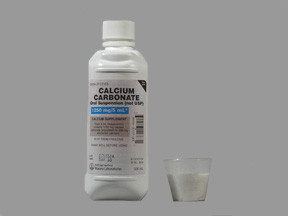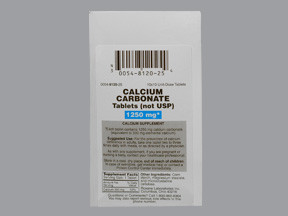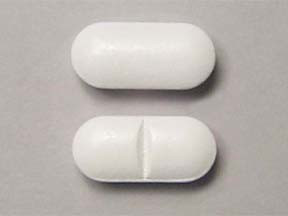CALCIUM SUPPLEMENTS - ORAL
PHONETIC PRONUNCIATION:
GENERIC NAME(S): calcium carbonate
Uses
USES: This medication is used to prevent or treat low blood calcium levels in people who do not get enough calcium from their diets. It may be used to treat conditions caused by low calcium levels such as bone loss (osteoporosis), weak bones (osteomalacia/rickets), decreased activity of the parathyroid gland (hypoparathyroidism), and a certain muscle disease (latent tetany). It may also be used in certain patients to make sure they are getting enough calcium (e.g., women who are pregnant, nursing, or postmenopausal, people taking certain medications such as phenytoin, phenobarbital, or prednisone). Calcium plays a very important role in the body. It is necessary for normal functioning of nerves, cells, muscle, and bone. If there is not enough calcium in the blood, then the body will take calcium from bones, thereby weakening bones. Having the right amount of calcium is important for building and keeping strong bones.
How to use CALCIUM SUPPLEMENTS - ORAL
HOW TO USE: Take this medication by mouth with food. If your product contains calcium citrate, then it may be taken with or without food. Follow all directions on the product package, or take as directed by your doctor. For best absorption, if your daily dose is more than 600 milligrams, then divide your dose and space it throughout the day. If you are uncertain about any of the information, consult your doctor or pharmacist. If you are using the chewable product, chew it well before swallowing. If you are using the effervescent tablet, allow the tablet to fully dissolve in a glass of water before drinking it. Do not chew or swallow the tablet whole. If you are using the liquid product or powder, measure the medication with a dose-measuring spoon or device to make sure you get the correct dose. Do not use a household spoon. If the liquid product is a suspension, shake the bottle well before each dose. Use this medication regularly to get the most benefit from it. To help you remember, take it at the same time(s) each day. If your doctor has recommended that you follow a special diet, it is very important to follow the diet to get the most benefit from this medication and to prevent serious side effects. Do not take other supplements/vitamins unless ordered by your doctor. If you think you may have a serious medical problem, seek immediate medical attention.
Side Effects
Precautions
Interactions
Overdose
Images

- color
- white
- shape
- oblong
- imprint
- 54 302
Reviews
Faq for CALCIUM SUPPLEMENTS - ORAL
Calcium supplements are used to prevent or treat calcium deficiencies in the body. They are commonly recommended for individuals with osteoporosis, as well as for those who may not be getting enough calcium through their diet.
The most common types of calcium supplements include calcium carbonate, calcium citrate, and calcium phosphate. Each type has its own strengths and is absorbed differently by the body.
It is generally recommended to take calcium supplements with food to enhance absorption. The specific dosage and frequency will depend on your individual needs, so it is best to consult with a healthcare professional for personalized advice.
Calcium supplements may interact with certain medications, so it is important to inform your healthcare provider about all the medications you are taking. Some medications, such as certain antibiotics and certain heart medications, can interfere with calcium absorption.
Common side effects of calcium supplements include constipation, bloating, and gas. Taking too much calcium can also lead to hypercalcemia, which can cause symptoms such as nausea, vomiting, confusion, and muscle weakness.
The recommended daily intake of calcium varies depending on age and gender. Generally, for adults between 19 and 50 years old, the recommended intake is 1,000 milligrams per day, while for adults over 50 years old, it is 1,200 milligrams per day.
It is possible to meet your calcium needs through a well-balanced diet that includes calcium-rich foods such as dairy products, leafy greens, and fortified foods. However, some individuals may require calcium supplements to ensure adequate intake.
Consuming large amounts of caffeine and alcohol may interfere with calcium absorption in the body. It is best to moderate intake of these substances and consult with a healthcare professional for personalized advice.
While calcium supplements are generally considered safe, certain individuals, such as those with kidney problems or those who are prone to kidney stones, may need to be cautious. Always consult with a healthcare professional before starting any new supplement.
Disclaimer
IMPORTANT: HOW TO USE THIS INFORMATION: This is a summary and does NOT have all possible information about this product. This information does not assure that this product is safe, effective, or appropriate for you. This information is not individual medical advice and does not substitute for the advice of your health care professional. Always ask your health care professional for complete information about this product and your specific health needs.






No Reviews Yet